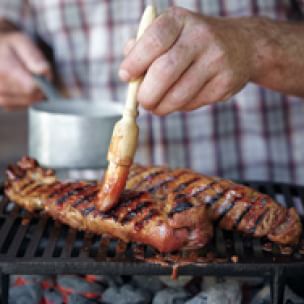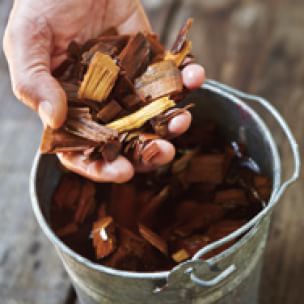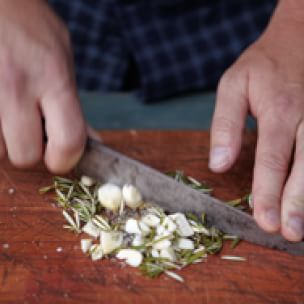Grilling contributes some flavor in the form of smoke that rises from small flare-ups. But smoke from wood chips or chunks, dried herbs, or grapevine cuttings add even more flavor. In addition, basting food with spirited sauces and liquids while grilling boosts flavor. There are also ways to season food before the grill is even lit by marinating, brining, and dry rubs.

Marinating
At their most basic, marinades combine a handful of ingredients: oil, an acid, and seasonings. Use nonreactive containers, such as glass, stainless steel, or plastic, for marinating larger cuts of meat. Sealable plastic bags allow you to coat food with smaller amounts of marinade. Marinating times will vary from 30 minutes for small pieces of fish to 3 days for a large roast. If marinating for longer than 30 minutes, cover the food and refrigerate it. Also, dry meat before grilling—moisture inhibits searing and the development of a crisp, browned exterior.
Oils: Olive, canola and grapeseed oil help protect the surface of the food and carry the flavor of spices, herbs, and other aromatics.
Acid: Wine, balsamic vinegar, yogurt and citrus juices tenderize meat while adding bright, fresh flavors. However, using too much acid or soaking the food too long can result in mushy meat or tough seafood. If you plan to marinate small cuts of meat or fish for more than an hour, add a minimal amount of acidic ingredients.
Seasonings: Garlic, onion, ginger, lemongrass, rosemary, and cumin seed, among others, provide endless flavor variations in otherwise simple marinades. Chopped garlic and fresh, whole leaf herbs may scorch over high heat, so brush them off the food before grilling.

Brining
A brine penetrates into food—typically pork, chicken, or turkey—much more deeply than a marinade. Salted water from the brine enters each meat cell, making the meat juicier and infusing it with flavor.
To make a basic brine, stir in 1/4 cup kosher salt for every 4 cups of liquid. (The salt should be kosher salt, which does not contain additives.) You can use water only or mix in other flavorful liquids, such as orange juice, apple cider, or wine. Brown sugar, lemon zest, garlic, ginger, sage, rosemary, and cinnamon sticks are just a few popular flavoring ingredients.
Heating the brine helps dissolve the salt and meld the flavors, but be sure to cool the brine completely before adding meat, poultry, or fish. Submerge the food completely in the brine, using nonreactive containers or sealable plastic bags for smaller cuts. Use a stainless-steel stockpot or clean plastic bin for large roasts and whole poultry. Then cover and refrigerate.
Individual cuts, such as pork chops or chicken breasts, need 2 to 4 hours of brining. A pork tenderloin can be brined overnight, while a whole turkey is best after 24 hours of brining. Always discard brine solutions; do not reuse them. The brine’s salt solution may inhibit deep browning, so consider basting meat or poultry with a basting liquid or sauce toward the end of grilling.

Dry Rubs & Pastes
Both dry spice rubs and thick, wet pastes add bold flavors and can be applied up to a day in advance or just before grilling. Dry meats and vegetables with paper towels, then rub in the mixture evenly on all sides. Treat delicate fish gently, however, to prevent tearing. To coat small pieces of food quickly, combine them in a plastic bag with the spices and shake well.
Blend paste mixtures until smooth to ensure that ingredients such as the whole leaves of fresh herbs or large pieces of garlic release as much of their aromatic oils as possible. Dry rubs can be easily transformed into pastes by pureeing them with liquids such as lemon juice, tomato juice, soy sauce, apple cider, and flavored oils.

Basting
Basting helps seal in moisture and create a delicious, attractive exterior. A basting liquid should always include some fat to carry flavor and prevent the food from drying out. Adding sugar and other sweet ingredients, such as honey, maple syrup, or melted jellies, will create a delicious, glossy glaze, but they should only be applied during the last few minutes of grilling because the sugars will burn easily. Avoid basting too often as uncovering the grill allows heat to escape and prevents proper cooking.

Wood Flavoring
Hickory, mesquite, oak, and pecan have pronounced wood flavors. Apple, cherry, and plum produce a more mild, fruity smoke. Alder has the least assertive wood flavor. Resinous soft woods, such as those from the pine family, should never be used. For a charcoal grill, soak wood chips, herbs, or grapevine cuttings in water for 30 minutes, then drain before using. Do not soak wood or aromatics if using a gas grill, as they are sometimes difficult to ignite.
Alder: Alder wood chips work well for fish (including salmon) and light meats.
Apple: Apple wood chips enhance poultry, pork, salmon, sweet glazes, and fruit sauces.
Cherry: Fruity cherry wood chips, like apple wood, complement poultry and seafood.
Hickory: Hickory wood chips give a slightly nutty flavor to pork, chicken, and turkey.
Mesquite: The fragrant hardwood most frequently used for grilling, mesquite wood is an essential component to grilled beef fajitas and also adds flavor to fish, poultry, and pork.
Oak: Oak chips complement pork and beef.
Pecan: Similar to hickory, pecan wood chips pair well with poultry and pork.

Herb Flavoring
Choose herbs to enhance grilled food the same way that you would with indoor cooking.
Fresh or dried rosemary sprigs: Use rosemary sprigs to impart a pleasantly woodsy flavor to beef, lamb, pork, poultry and meaty fish fillets or steaks.
Dried basil stems: Infuse a wide variety of foods with the sweet herbal scent of dried basil stems.
Mixed herbs: Mixed herbs create fragrant smoke that suits a wide variety of foods; dried mixed herbs are sometimes sold in tea-bag-type packets.
Grapevine cuttings: A by-product of winemaking, grapevine cuttings add fruity flavor to grilled beef, lamb, poultry and fish.

Cedar Plank
Here, the meat is laid on a natural, untreated cedar plank, which is then placed directly on the grill rack. Place a bed of fresh dill, fennel fronds, bay leaves or rosemary sprigs between the meat and the plank before grilling to add moisture and herbal flavor.
Soak an untreated cedar plank in water to cover for at least 1 hour. Prepare a grill for direct-heat grilling. Place the plank on the grill, close the lid, and heat until the plank begins to smoke and crackle, about 5 minutes. Arrange the food on the plank, close the lid, and cook to desired doneness. The plank will smoke slightly, infusing the meat. Have a water-filled spray bottle on hand to extinguish any flames (but be careful—the steam created from the water can cause burns).





